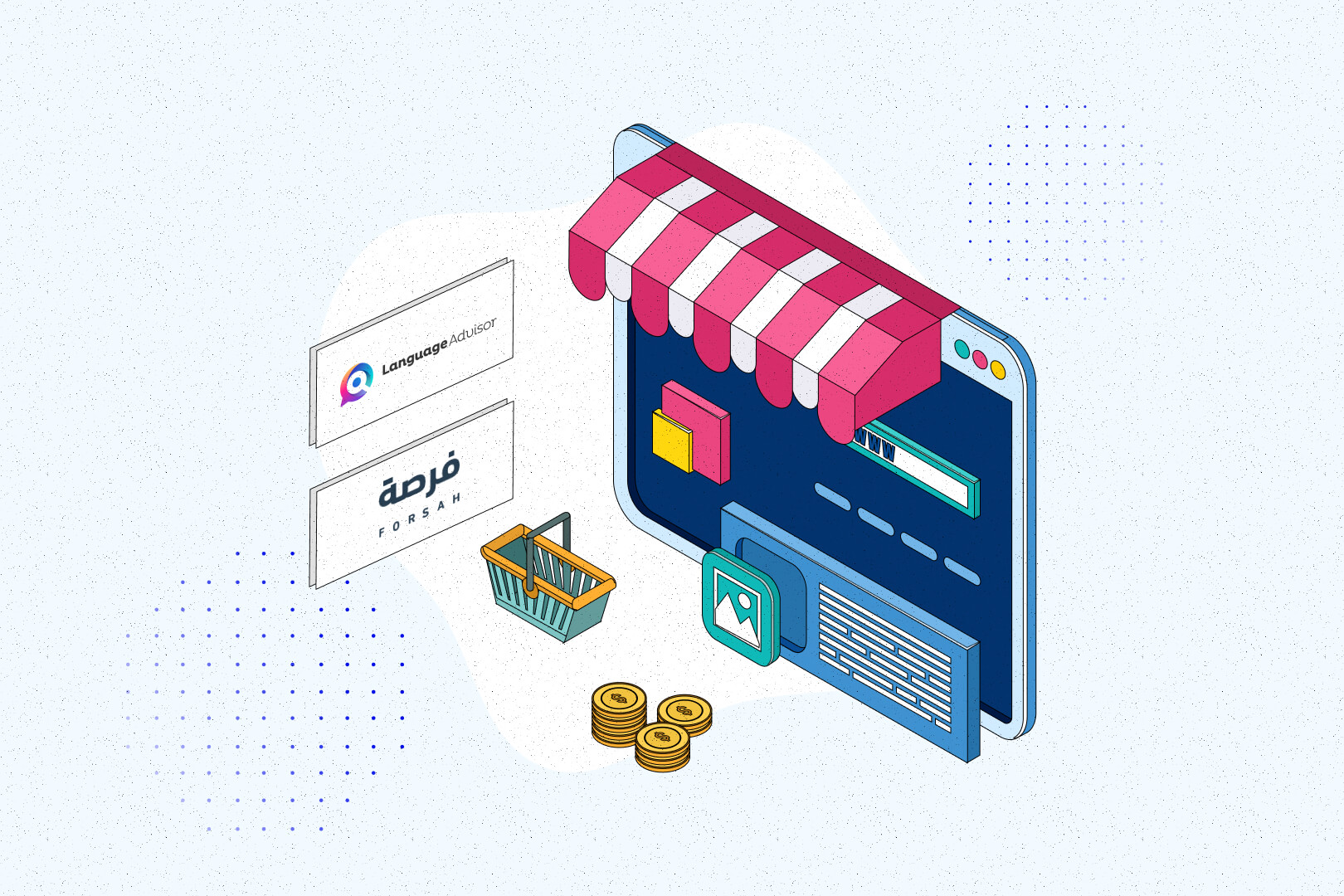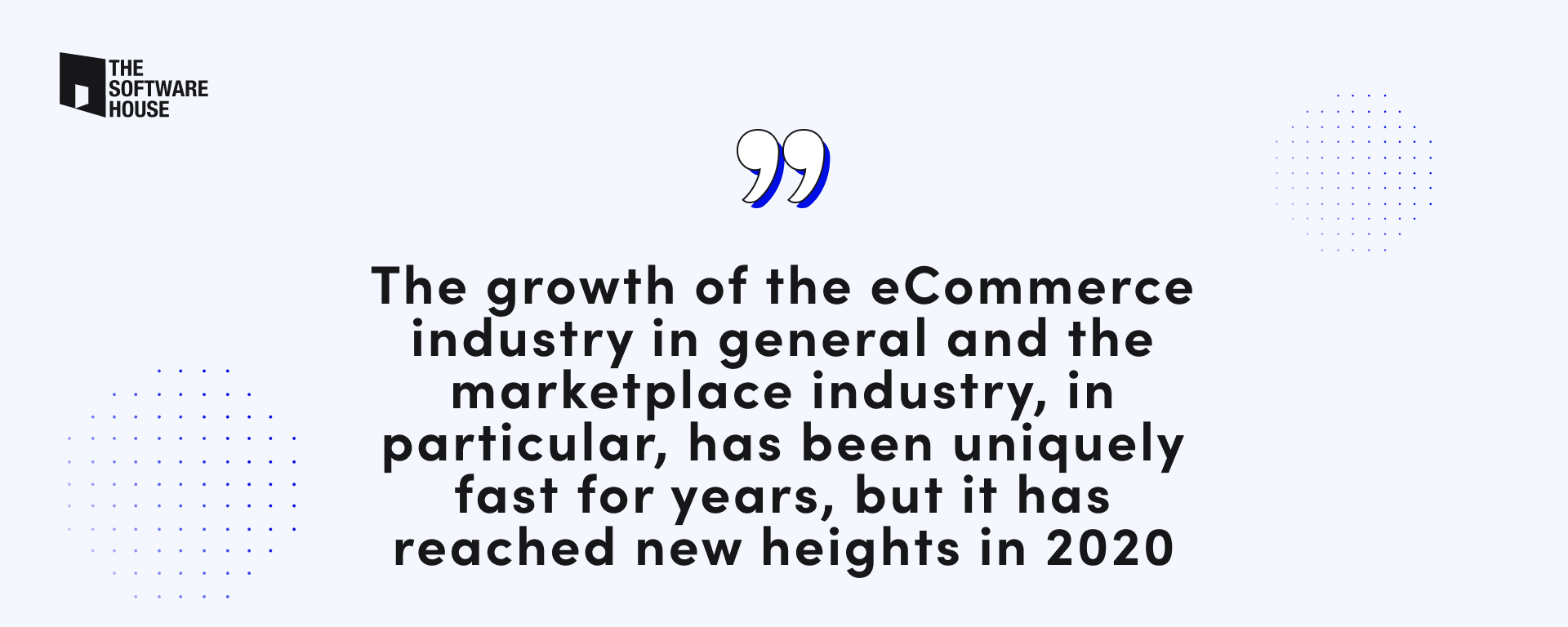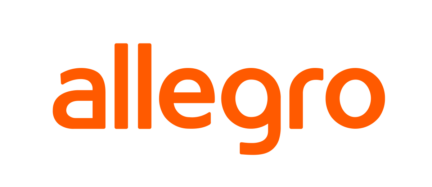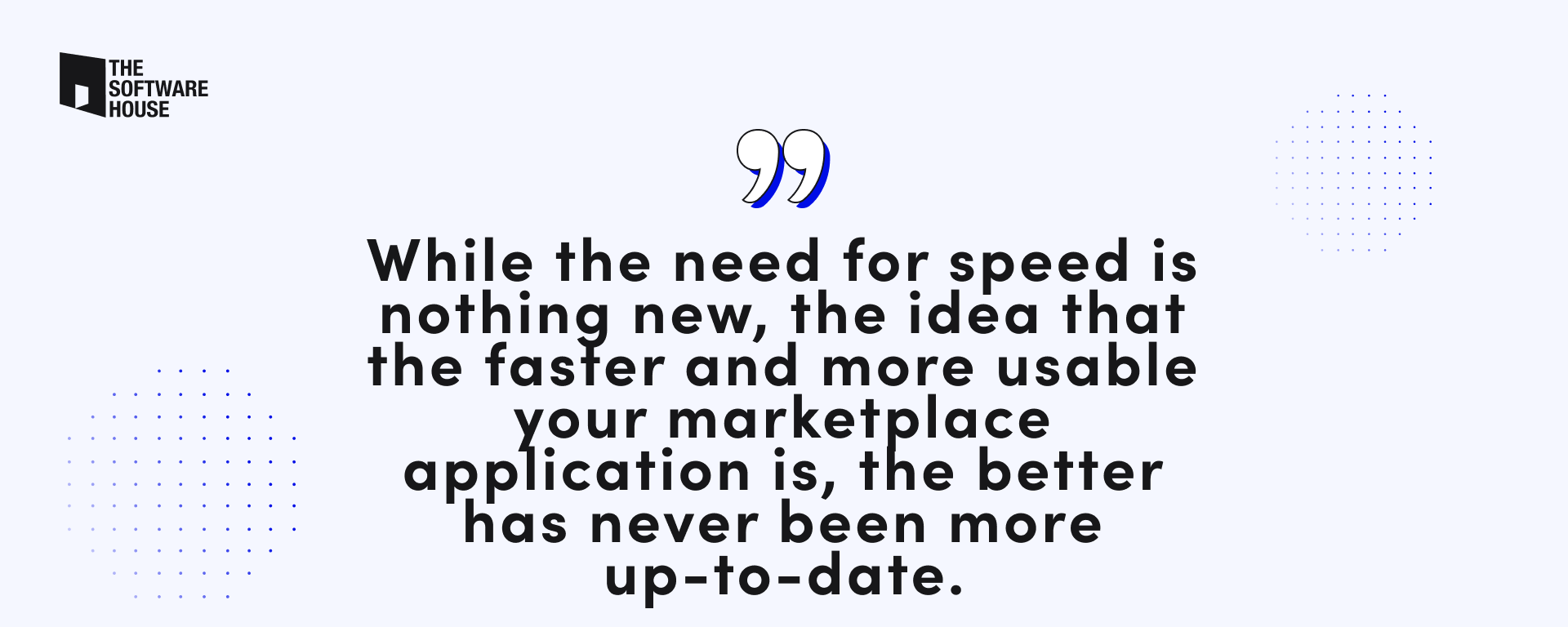19 January 2021
Marketplace development – how to succeed with a marketplace app in 2021?

Marketplace development is evolving quickly and constantly – much like the entire industry it serves. The year 2020 brought yet another record-breaking numbers for online marketplaces – and not just because of the COVID-19 pandemic. It didn’t just grow in size, but also in sophistication and vendor/customer expectations. The barriers to entry and competition are also growing bigger and bigger. How to go about marketplace development to succeed in 2021?
With double-digit growth numbers worldwide, it may seem that getting into the marketplace industry is quite easy, but actually, it couldn’t be further from the truth. It takes a lot of know-how and if you want to measure up to the already established market players, you have your job cut out for you! Software development is a good place to start this conversation because your marketplace application would have to account for every single area of your business operation.
Before we get to the hard part, a couple of encouraging words.
Marketplaces in 2020 – a record-breaking year
The growth of the eCommerce industry in general and the marketplace industry, in particular, has been uniquely fast for years, but it has reached new heights in 2020. The COVID-19 pandemic saw more people than ever do their shopping online. But it was just an extra boost for an industry whose growth doesn’t seem to have an end in sight.
According to the eCommerce Trends Report 2021 by Divante, marketplaces grew 100% in 2020 while department stores remained flat for the third year in a row. The past 12 months saw Amazon add 100,000 jobs in the first week of the pandemic alone. More than 1.3 million new vendors joined the platform at the same time.
It wasn’t just the international giants that did so well. Allegro, Poland’s biggest online marketplace, raised over $2.3 billion in the largest ever Warsaw IPO.
Sounds good, doesn’t it? But these companies and any other successful marketplace have generated a lot of know-how to be able to navigate the marketplace industry so well. Let’s find out why having all this knowledge is so necessary.

What is a marketplace?
Marketplaces are a subset of eCommerce, but marketplace development projects tend to be very different from most eCommerce projects. As you most likely know, in marketplace applications, there are multiple vendors and the app owner usually acts as an intermediary between them. It is basically a digital adaptation of a traditional marketplace, where people gathered to buy and sell goods and everyone could be either buyer or seller (or even both at the same time).
Marketplaces development – why is it so demanding?
Marketplaces represent a far more complex relationship than the typical one vendor – multiple customers model in most eCommerce apps and it has all kinds of implications.
First of all, the process of implementing payments is usually far more complicated. It involves choosing when and how money is sent, shared and divided between each of the vendors and the intermediary.
This issue is further complicated by the fact that all marketplaces differ in the degree to which the intermediary takes responsibility for the product. Usually, the bigger the responsibility, the bigger the commission fee. As a result, in terms of payments, no two marketplaces are created equal. When all is said and done, it usually requires a custom-coded solution. The Polish platform Allegro took years to come up with a custom payment solution after having failed with ready-made options.

In terms of delivery, the challenge is similar – your delivery service provider is forced to pick up packages from multiple starting points rather than from one or a few warehouses. These processes also have to be accounted for in marketplace development.
Another big challenge is getting vendors to commit, that is restrain themselves from trying to bypass commission faces by encouraging their customers to do business outside the platform. Some marketplaces offer vendors various perks, such as increased security and the guarantee to easily get their money back in case of any troubles with the custom. The intermediary’s work as an arbitrator also requires consideration in development.
To do all this and still turn this into a profitable business, you need a big scale. This is why there are so many small-time eCommerce stores, but relatively few marketplaces. It’s true that more and more regional marketplaces are becoming successful – Bikroy and Go-Jek are following the example of Craigslist and Uber respectively on a national level. However, they are still large businesses when compared to most eCommerce platforms.
At the end of the day, all of it means that there are very few ready-made solutions for multi-vendor marketplaces. There are simply too many variables in how such marketplaces work and too many operational considerations for such ready-made solutions to be viable. To stand a good chance of making it in the business, you need to have a very well thought out business model, knowhow of your niche and top-notch custom software development.

Marketplaces development – challenges for 2021
That sure sounds like a lot of work! Indeed, while some challenges have been around since pretty much forever, there are also a lot of new trends you should be aware of in order to be truly ready for marketplace development. Pay special attention to them when you get into market development in 2021.
Content and community are your top priority
I mentioned the importance of providing vendors with all kinds of perks. In a more general sense, it is about giving them more value for their money (and data). One way is to give them the proper tools to take care of their content. With each year, the value of engaging SEO-ready content keeps growing. This includes the ability to various content forms, SEO tools, reviews and more that make it possible for ambitious vendors to rank higher both in Google SERP and your own internal results.
Beyond that, it is about creating a community around your platform and content is a great way to go about it. Etsy is a good example of a marketplace that has managed to achieve it.
Data privacy
Thanks to data, marketplaces are able to target their prospective customers with better ads and content and increasing conversions. But this makes them even more responsible for making sure that the sensitive data about their vendors and customers is safe. Especially considering how fragmented the data can be with so many parties/admins involved.
In the Property Finder project, our developers worked towards achieving their data privacy goals by using formatters for removing sensitive data such as names and addresses so that they will never appear in application logs.
Mobile
The mobile channel is becoming increasingly important with more and more conversion being made locally, by targeting mobile devices with ads about local vendors. The last year saw higher adoption of the mobile checkout and lots of discussion on the best way to ensure higher conversion rates.
Now you can also create great mobile experiences by using technologies such React Native instead of native mobile technologies, without losing quality and performance. Read more about React Native development at TSH.
Never-ending performance race
While the need for speed is nothing new, the idea that the faster and more usable your marketplace application is, the better has never been more up-to-date.
At The Software House, we have always strived to achieve these objectives in marketplace/eCommerce projects:
- In Property Finder, we introduced lazy loading and optimized its service-oriented architecture.
- In the Forsah marketplace project, we spent a lot of time refining the user workflows so that the UI is as usable and straightforward as possible.
- In some of our multi language projects, we sped up the development process itself by using a custom-built tool for managing translations called Babelsheet. We worked on projects that featured over 30 language versions.

Technologies for marketplace development
What software development technologies can you use to achieve all of these objectives?
JavaScript
Called the language of the web, JavaScript has always been the cornerstone of web development. But with the release of platforms such as Node, it has become possible to develop an entire app with JavaScript alone. Node is perfect for microservice-based architecture, while frontend frameworks such as React or Vue will improve interactivity. You can also use tools such as Next.js to combine client-side rendering with server-side rendering to improve performance for the end user.
PHP
Custom development with Symfony or Laravel is also a sound choice for marketplaces. Symfony powers some of the marketplace projects developed by TSH (e.g. Property Finder) and they all resulted in highly efficient and stable applications that met all the project requirements.
React Native
In order to develop for multiple platforms, especially for mobile, with one code base and still maintain great performance, a mobile application framework such as React Native could prove very useful.
Docker
Docker can help with both security and scalability as the dockerized pieces of software can be easily moved to other servers and work the same. And when the account of each vendor on your marketplace platform is another separate (dockerized) piece of software, it creates another layer of security for your codebase and data on the server.
Marketplaces development – summary
There is no doubt about – the marketplace will continue to grow at a double-digit pace in the future. But:
- In order to succeed, you need to invest a lot in marketplace developers because the competition and sophistication are growing.
- Some challenges for marketplace development do not change – they are influenced by the nature of marketplaces itself and by the never-ending race for performance.
- Other challenges, such as data privacy, scalability or the importance of the mobile channel, become more and more prominent with time.
- Ultimately, custom web development is essential for marketplaces.
To deal with all of this, you need the top developers that overcome these challenges every day and come up with creative ways to turn great user stories into efficient software that captures the business context of your marketplace app. See our portfolio, which includes marketplace projects. Find out how we managed to meet the expectations of our customers. Start your own successful marketplace project by contacting us. Initial consultations are free of charge.
Interested in developing a great marketplace app of your own? Or perhaps you already have one and need a team that can help it achieve all your business objectives?
Contact The Software House and get yourself a team that has already done that many times over!

